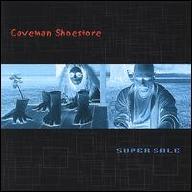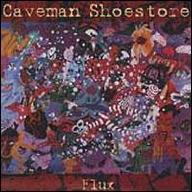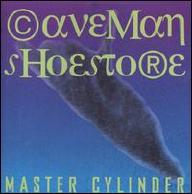Pacific Northwest denizens bassist Fred Chalenor and drummer Henry Franzoni had been playing together on and off at least since 1976 and a band called Face Ditch, which also included keyboardist Neil Minturn. Well over a decade later Chalenor and Franzoni were playing at a music festival in Portland, OR, when they met singer/keyboardist Elaine diFalco, who had recently moved to Portland from Phoenix, AZ, with a punk band called the God Wads. Chalenor, Franzoni, and diFalco agreed to form a trio, and in late 1991 Caveman Shoestore (with a name taken from a different, very short-lived Seattle band) were born. The group's first recording was a ten-track self-released cassette entitled Rock, with Chalenor and Franzoni playing as a duo on eight tracks and diFalco featured on two.
The band's first full-length CD as a trio, Master Cylinder, was released by Tim/Kerr Records in 1993, and has since been described by album producer Alessandro Monti as influenced by everything from Conlon Nancarrow to Black Sabbath and from grunge to prog rock. Some tracks might also lead to comparisons with Discipline-era King Crimson -- although overall the record seems designed to be played at parties in which guests could be asked "what instrument do you think that was?" in reference to the apparent predominance of electric guitar played in a metal-grunge style. Surprise: "NO GUITARS!" exclaim the liner notes...the speaker-busting sound in question came from Chalenor's fuzz bass. Coupled with Franzoni's sometimes pounding rhythms on the "membranophones," the Caveman Shoestore of Master Cylinder could be a heavy item indeed, but the band's sound was balanced by diFalco's enjoyably rich yet never histrionic vocals, often in multi-tracked harmonies, as well as her solid electric keyboard work.
In 1994 the second Caveman Shoestore album on the Tim/Kerr label, entitled Flux, was released; the album found the band expanded to a quartet including Amy DeVargas on vocals, second bass, and cello -- indeed, DeVargas was a somewhat more prominent vocal presence (and more assertive in the higher ranges) than diFalco, and wrote or co-wrote five album tracks. Guest Jen Harrison was also featured on French horn. The album had a more diverse sound overall than Master Cylinder -- without the heavy metal masquerades prominently featuring Chalenor's fuzz bass disguised as a roaring guitar -- and placed considerable emphasis on Chalenor/DeVargas interlocking bass parts, tribal-flavored rhythmic undercurrents, and diFalco's keyboard work often emphasizing the Hammond organ, although her synth and piano were featured as well. In an interview with Allen Huotari on the All About Jazz website, Chalenor notes that on the first two Caveman Shoestore CDs, the band explored "really crazy" polyrhythms in the context of "sick" pop tunes.
The '90s would prove to be a tremendously busy time for Chalenor, who had emerged as one of the most in-demand electric bassists on the Pacific Northwest creative music scene -- and not restricted to the Pacific Northwest either, as he and Franzoni recorded with New Yorker Elliott Sharp as the Boodlers trio, and Chalenor toured and recorded with Wayne Horvitz's bands Pigpen and Zony Mash while maintaining other collaborative connections. Amidst all this activity (also including marriage between Chalenor and diFalco), big changes in Caveman Shoestore were about to arrive thanks to Chalenor's trusty fuzz bass, documented in an Italian fanzine that drew the attention of British fuzz bass king Hugh Hopper of Soft Machine fame, who contacted Chalenor and before long the two bassists were vowing to work together. In March of 1995, Hopper joined the group at Portland's Sound Impressions studio to record Caveman Hughscore -- with "Shoestore" changed to "Hughscore" in the band name to reflect Hopper's presence not only as second bassist but also as composer of the material. Multi-layered, polyrhythmic, and quirky yet tuneful, the album stands as a strong outing for all concerned, certainly a feast for "fuzzaholics" and lovers of Hopper-esque angular basslines (played by two bassists in this case), with strong rhythmic underpinnings from Franzoni and assured keyboard and accordion work from diFalco -- not to mention her typically wonderful vocals, singing both solo and in multi-tracked harmony, and on one occasion talking in one channel while Franzoni (who has a predilection toward spoken interjections) talks in the other.
By the following year some changes had been made -- Chalenor and diFalco moved to Seattle and Franzoni was gone from the band, the drummer later proclaiming Caveman Shoestore (including Caveman Hughscore) to have "died in late 1996," although such a pronouncement would prove to be premature. But meanwhile, when the group reconvened in Seattle at Flora Avenue Studio in spring of 1996, "Caveman" was completely gone from the band name, and the core group was considered to be Hopper, Chalenor, and diFalco, with guests Will Dowd on drums, Jen Harrison on French horn, and Craig Flory (who had been a member of Face Ditch during the early '80s) on reeds. Horvitz was the producer of the session (and also played a "ring modulated keyboard solo" on one particularly upbeat track), which saw release as Highspotparadox by Hughscore, again on the Tim/Kerr label, in 1997. Another strong outing, the album at times has a jazzier and more spacious vibe than the preceding disc, due in part to Horvitz's production sensibilities and Dowd's comparatively light drumming style, not to mention the tenor sax, clarinet, and bass clarinet contributions of Flory.
The most ambitious Hughscore CD, however, would arrive with Delta Flora, released by Cuneiform in 1999. (It is also, unlike the Tim/Kerr label releases that have gone out of print, readily available, with a reprinting by Cuneiform in early 2009.) Between September 1997 and September 1998, basic tracks were recorded at Flora Avenue Studio in Seattle and then Hopper and diFalco completed recording at Delta Studio in Chartham, Canterbury, England (hence the title Delta Flora). The quartet of Hopper, diFalco, Chalenor, and drummer/engineer Tucker Martine was supplemented by six guest musicians this time around, including a returning Craig Flory as well as Soft Machine saxophonist Elton Dean, trumpeter Dave Carter, trombonist Robert Jarvis, pedal steel player Jon Hyde, and flutist Chrystelle Blanc-Lanaute.
Although diFalco and Chalenor split up and diFalco moved to California (and later back to Oregon after touring in Europe with Thinking Plague, and later still to Colorado, participating in the 3 Mice trio with Hamster Theatre mainstay Dave Willey and Swiss multi-instrumentalist Cédric Vuille), the Caveman Shoestore adventure continued into the new millennium with a new release, Super Sale, on the Build-a-Buzz Records label in 2005. The band was back to its original name and lineup of diFalco, Chalenor, and Franzoni, who surmounted the logistics of living in three separate locations (with Chalenor in Seattle and Franzoni in Portland) to deliver arguably this trio's finest release to date, featuring crazy meters and polyrhythms expertly handled by Franzoni, beautiful and hypnotic multi-layered vocal overdubs from diFalco (not to mention her mastery of numerous electric keyboards including Fender Rhodes, Wurlitzer, Hammond B-3, and more), and Chalenor's typically wide array of bass voicings, of course prominently featuring some thick fuzz -- all in the context of concise avant pop offerings generally within the two- to three-minute range, expertly produced with all manner of quirky and mysterious sonic flourishes around the edges. Another Caveman Shoestore CD, entitled Frankensongs, is reportedly in the can. Meanwhile, Chalenor and Franzoni also resumed playing with keyboardist Neil Minturn as Face Ditch, releasing an eponymous CD on Build-a-Buzz in 2004. And sadly, Hugh Hopper, who played such an important role in the Shoestore/Hughscore trajectory, died of leukemia in June of 2009. ~ Dave Lynch, Rovi



















